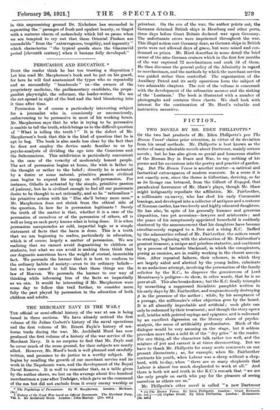THE MERCHANT NAVY IN THE WAR.t
Tim official or semi-official history. of the war at sea is being issued in three sections. We have already noticed the first volume of Sir Julian Corbett's history of the naval operations and the first volume of Mr. Ernest Fayle's history of sea- borne trade during the war. Mr. Archibald Hurd has now produced the first volume of a history of the war service of the Merchant Navy. It is no surprise to find that Mr. Fayle and he cover much of the same ground, for their subjects are nearly allied. However, Mr. Hurd's book is well planned and carefully written, and promises to do justice to a worthy subject. He begins by recalling the growth of our merchant service and its work in the Napoleonic wars, and the development of the Royal Naval Reserve. It is well to remember that, as a table given by the author shows, we lost on the average about five hundred merchantmen a year after Trafalgar, which gave us the command of the sea. but did not exclude from it every enemy warship or • Ths Psychology of Persuasion. By W. Macpherson. London : Methuen t History of Use Great War based on Official Documents. The Merchant Nary. 18: Dinah. By Zen Eden lo.ndon : GaranheRichards. les.1 Vol. By Archibald Hurd. London: John Murray. I2111. net.) privateer. On the eve of the war, the author points out, the Germans detained. British ships in Hamburg and other ports, three days before Great Britain declared war upon Germany.. The unfortunate crews were imprisoned throughout the war. This illegal action cost Germany dear, as German ships in British ports were not allowed days of grace, but were seized and con- demned as prizes. Mr. Hurd describes in some detail the brief career of the nine German. cruisers which in the first few months of the war captured 72 merchantmen and sank 54 of them. He then discusses the general policy of the Admiralty in regard to merchantmen, and the methods by which the merchant service was guided rather than controlled. The organization of the Auxiliary Patrol and its early operations form the subject of two admirable chapters. The rest of the volume is concerned with the development of the submarine menace and the sinking of the Lusitania.' The book is illustrated with a number of photographs and contains three charts. We shall look with interest for the continuation of Mr. Hurd's valuable and instructive narrative.


































 Previous page
Previous page